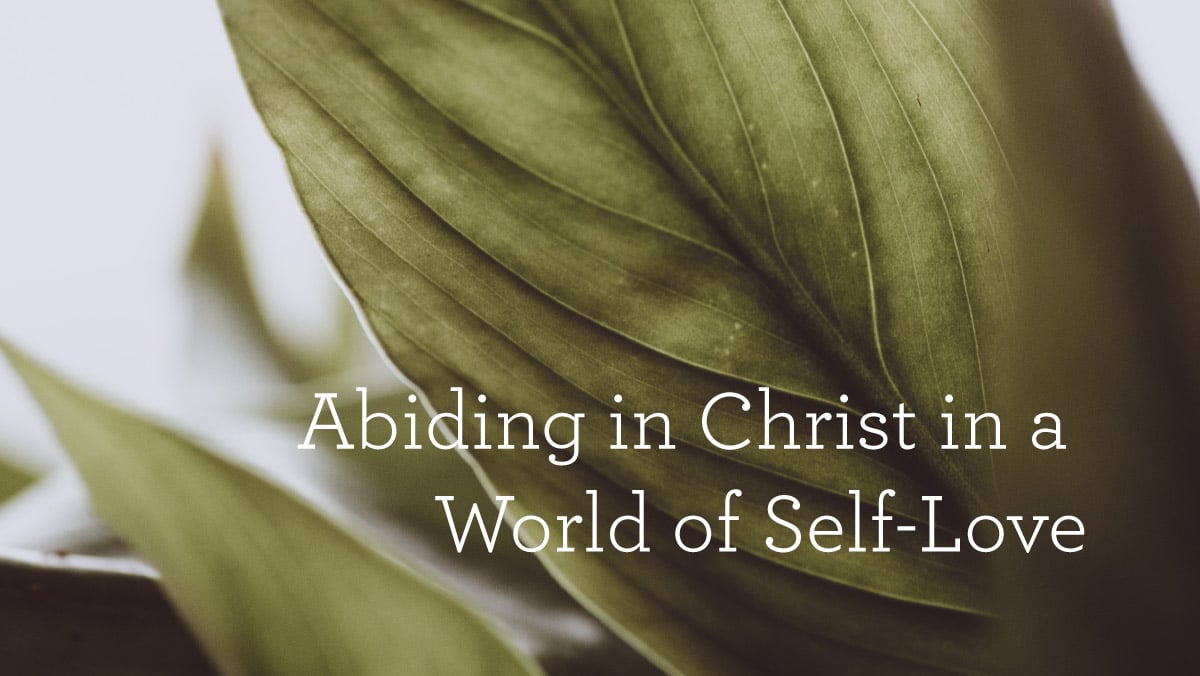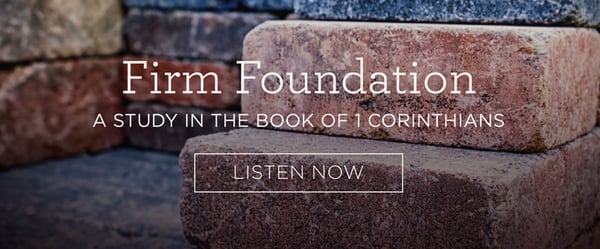
In the psychological realm, the word of our age is self. From self-care to self-talk to self-esteem, hardly a day passes when broadcasts, podcasts, podiums, and even pulpits fail to remind us that our fundamental problem is a dearth of self-regard. And the answer, we are told, lies in telling ourselves that we are lovable: “It doesn’t matter what I do. It doesn’t matter who I am. I am a lovable person.”
Despite this emphasis within our culture, it is a startling fact that the Bible contains no positive, explicit teaching about self-regard as it is propounded by our contemporaries. It is totally absent! And if we believe that the Scriptures contain “all things that pertain to life and godliness” (2 Peter 1:3), then we need to be prepared to see how God’s Word adjudicates the emphases of our culture rather than passively allowing those emphases to govern our understanding of the Scriptures.
The fact is that we are living in a culture which prescribes as a cure what the Bible describes as a sickness: “In the last days there will be times of difficulty. For people will be lovers of self” (2 Tim. 3:1–2). In an age of anxiety and despair, the self-regard the world promises will help us ultimately only adds to the difficulty. Christ, too, promises us confidence, assurance, contentment, and, yes, love—but none of these is a gift that we can grant ourselves from the well of our own resources. Instead, as Paul writes in 1 Corinthians 4:5, “each one will receive his commendation from God.”
In what follows in 1 Corinthians 4:6–7, Paul addresses the dangers of self-regard and, through a series of questions, seeks to reframe the Corinthians’ thinking accordingly. Whereas self-love endangers Christian communion by causing people to put themselves before others, Christian love engenders a spirit of humility before God, who is the source of our being, our value, and our joy.
The Problem: Pride
“I have applied all these things to myself and Apollos for your benefit, brothers, that you may learn by us not to go beyond what is written, that none of you may be puffed up in favor of one against another.” (1 Cor. 4:6)
The first-century Corinthian believers to whom Paul wrote had a problem with pride. They were proud of everything. They were proud of their intellects, and they were proud of their teachers. Even those spiritual gifts that God had given became an opportunity to puff their chests up as they walked about. It was a dreadful problem within the church—and where that kind of wrong perspective persists, disunity establishes a stronghold among God’s people.
To this point in the letter, Paul has been addressing the problem of factions and favoritism in Corinth, where some said, “I follow Paul,” and others, “I follow Apollos” (1 Cor. 1:12). He and Apollos were not agitators of disunity. Both preached the same Gospel! But in a trumped-up opposition between the two preachers, many of the Corinthians found an opportunity to express their own “jealousy and strife” (1 Cor. 3:3), which came from a sense that they were wise in themselves (1 Cor. 3:18).
Christ promises us confidence, assurance, contentment, and love—but none of these is a gift that we can grant ourselves from the well of our own resources.
Thus Paul set out to correct the Corinthians by teaching them that “the word of the cross is … the power of God” (1 Cor. 1:18). The wisdom of the world says that we ought to lift ourselves up—that we ought to look within ourselves for encouragement and strength. But the wisdom of God is to glory in the cross—to marvel at the humiliation and death of Christ—and so receive the glory that comes from God. As Paul had written earlier,
God chose what is low and despised in the world, even things that are not, to bring to nothing things that are, so that no human being might boast in the presence of God. And because of him you are in Christ Jesus, who became to us wisdom from God, righteousness and sanctification and redemption, so that, as it is written, “Let the one who boasts, boast in the Lord.” (1 Cor. 1:28–31).
The Corinthians were thus not to “go beyond” what Paul had written to them to this point. The answer that Paul presented to the problem of pride in Corinth was the reminder that we have no reason for boasting—that we merit nothing, and all that we have received comes from the overflow of God’s love for us, demonstrated so clearly through the cross of Christ.
The Answer: Humility
“For who sees anything different in you? What do you have that you did not receive? If then you received it, why do you boast as if you did not receive it?” (1 Cor. 4:7)
Paul goes on to reinforce his point with three rhetorical questions, underlining the need for humility before God and people.
He begins by asking the Corinthians, in effect, “What gives you the right to regard yourselves as superior? Why do you believe that you should be preferentially treated?” For a long time, our culture has sought to drive into our minds that each of us is “special,” “gifted,” “unique.” But the (hard) truth is that if we were gone tomorrow, the world would keep spinning. Would we be missed by our loved ones? Of course. But the problem in much of the church is the same problem Paul points out to the Corinthians: we place far too much importance on the belief that we are wonderful, that we are different, that we are special, and—if we’re honest—that the world needs us as much as it needs God.
All that we have we received comes from the overflow of God’s love for us, demonstrated so clearly through the cross of Christ.
The second question reinforces the first: “What do you have that you did not receive?” Were you raised well? If so, was that not a gift from God? Do you live in a free and prosperous nation? Is that not a gift from God? Is not your very place in the church nothing less than a gift from God? He gave us redemption. He gave us forgiveness. He gave us hope. He gave us ability. He gave us a purpose. He gave us a future. He gave it all to us. It would be foolish for us to look with upturned noses on anyone else! None of us deserves God’s gifts.
Finally, Paul asks, “Why do you boast as if you did not receive it?” With this question, he convicts us of the pride we nurture in ourselves, claiming the credit for what God has given. It is only when we come to the cross that we find out who we really are, as Isaac Watts wrote in the beloved hymn:
Alas! and did my Savior bleed,
And did my Sov’reign die?
Would He devote that sacred head
For such a worm as I?1
Many today would disparage such a phrase as “worm theology”—as unnecessary and harmful self-disparagement. But while we do want to avoid denigrating the work of God’s hands in ourselves and in others, the reality is that humankind truly is of small account before our infinitely holy God. As a worm is next to nothing before a man or woman, so we are miniscule and lowly before the awesomeness of our Creator, in whom and through whom and for whom we exist. Yet still, Scripture assures us, He will exalt the humble “at the proper time” (1 Peter 5:6).
In Christ: Glory
“As it is written, ‘Let the one who boasts, boast in the Lord.’” (1 Cor. 1:31)
It is an amazing thing that God has brought us into His family. It is an incredible thing that He gave His Son to die for sinners like us. In this, God has shown His love for us (Rom. 5:8). Nevertheless, we need always remember that God has not loved us because of some value in us. To the contrary, we are valuable because God loves us. We are worthy because Christ, from the deep well of His own grace, died for us, undeserving though we were, and so we have come to share in His worthiness.
The danger of self-regard will always be in its dependence upon the self. Self-care, self-talk, self-esteem, and the like can only take us as far as the self will go, and they will only be as dependable as the self can be—which is to say, not very dependable at all. But when we find our value, our confidence, our joy by turning our gaze to the Savior who died for us and welcomed us into His family, then we will have hope “as a sure and steadfast anchor of the soul” (Heb. 6:19). From Christ will overflow all the riches of God’s grace in faith, hope, and love, empowering us to stand firm in this world and in its trials.
In Christ we have a firm foundation and the hope of glory. So “let the one who boasts, boast in the Lord”!
This article was adapted from the sermon “A Biblical Self-Image” by Alistair Begg.
-
Isaac Watts, “Alas! and Did My Savior Bleed” (1707).↩︎
Topics: Articles
